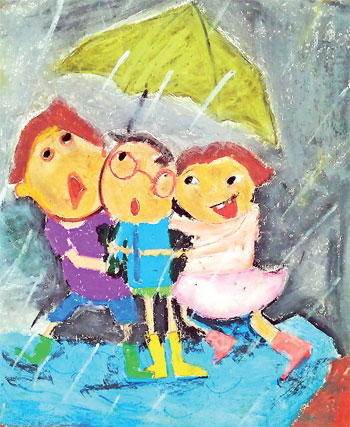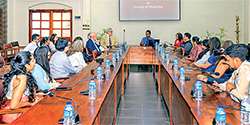The First NO and thereafter!
 Parents are requested to roll back their memory to the point that their adorable little angel first said ‘No!’Enjoying the babyish gibberish and taken with the same enthusiasm that any new word from the child is greeted with, parents in all likelihood have not realized that it is the first expression of free will. The baby has found its own mind. Unless the child is handled with care, understanding and maturity, this might be the starting point of a life time of defiance of authority. It might start slow and go more or less unnoticed at the beginning.
Parents are requested to roll back their memory to the point that their adorable little angel first said ‘No!’Enjoying the babyish gibberish and taken with the same enthusiasm that any new word from the child is greeted with, parents in all likelihood have not realized that it is the first expression of free will. The baby has found its own mind. Unless the child is handled with care, understanding and maturity, this might be the starting point of a life time of defiance of authority. It might start slow and go more or less unnoticed at the beginning.
HOLT VERSUS DOBSON
Sixties and seventies are regarded as the age of permissiveness and the Hippie culture in the Western world. John Caldwell Holt, best-selling author of books for parents wrote Escape from Childhood during this period. He advocates that children of whatever age, should have the right to experience sex, drink, use od drugs, drive, vote, work, own property, travel, have a guaranteed income etc. This type of abolition of the protectorate position of parents was called Positive Parenting. The subsequent total degeneration of discipline in those countries is attributed to this fallacy. Dr. James Dobson who wrote Dare To Discipline steadfastly stood for Disciplining the children. He epitomized the calamity by way of a beautiful story.
THE FROG IN THE BASIN
If a frog is put in a basin of cool water, it would enjoy the environment and not jump out, as it is easily capable of. If the water is now heated very slowly, the temperature of the water will rise very slowly. The frog will still not jump out. The reason is that the frog is a cold-blooded animal, whose body temperature varies with the external temperature. This is unlike warm-blooded animals like humans who have a fixed body temperature. The frog’s body temperature goes up with that of the water and it does not realize the calamity taking place slowly, until it is too late. On the contrary, if the frog was thrust in to a basin of hot water, it would immediately understand the danger and jump out. Dobson posits that the humans too react to situations in the same way. They would mobilise all resources available, to overcome a sudden calamity like a Tsunami, earthquake, flood, earth slip etc. However when a far worse calamity like eroding of the social fabric through drugs, permissiveness, indiscipline happens, the humans take the attitude of ‘wait and see’.
ASSERTIVENESS – THE MIDDLE GROUND
Most parents in general, fall in to one of two extremes. The passive group gives in to every whim and fancy of the child. In effect, they become servants of the child at the end. Like the frog, they do not understand the eroding of their authority little by little, in front of the developing strong will of the child. It starts with sweet no’s that are enjoyed by the parents. But gradually the child takes charge and the parent ends up in giving in. Very many households end up being dictated by the will of the children. These are the households that willfully make the child the Monarch of the house. On the other hand, the aggressive group tries to impose its authority on the children by various forms of punishment – subtle as well as harsh.
Authoritative punishment is never accepted by the recipient, but is only tolerated at its best. If the child cannot unleash the anger and resentment on the strong and dominant parent, it learns to unleash it on others who are less powerful than himself. The best example is ragging in the universities. The innocent ‘freshers’ who suffer at the hands of the all-powerful seniors, unleash terror on the next batch of freshers. Assertiveness on the other hand is to get the right thing done by the child, without the parent getting emotionally involved by losing its temper and composure. If the child says no, when he is asked to eat, sleep, stop watching cartoons etc., the assertive parent will not take that, as the answer. However the parent will not show the child that he is angry either.
The assertive parent will repeat the instruction and insist that the child complies with the requirement, without raising his voice, stamping his feet, gritting his teeth, changing the facial expressions or showing any other sign of anger. If the child still tries to defy, he may stop communicating with the child in every way, but continue to communicate with the rest of the household in the normal manner. The child should realize that his defiance and bad behavior has not changed the normalcy of the household but has only isolated himself from the fun. If the child is smart, he will try to bypass the issue and get around the parent a little later. This is the point that the parent should continue to insist that the child first complies. The secret of success is not getting angry or showing resentment. The parent should understand that it is not a punishment for the child but a correction for the unacceptable behavior. In other words it is dissociating the offender and the offence.
LEARNING FROM OTHER COUNTRIES
In Africa, the mother carries the infant child on her back in a pouch all the time. She engages in all her household chores which are not affected by the arrival of a new born. The important thing is that the child cannot make eye contact with the child when it is in the pouch on the back. This makes it impossible for the child to ‘take control’. On the contrary, parents in South American countries do not make toddlers sleep separately in baby cots, but sleep with them. Ironically it has been found that this practice leads to more independence in later life. While Norwegian children are made to take calculated risks in adventurous activities, Chinese children are set goals that are slightly out of reach.
Northern European parents make the children play outdoors even in the freezing cold in winter going on the maxim ‘there is no such thing as bad weather – only bad clothing’. While parents in Vietnam do potty training before the child learns to walk, South Korean parents do not have special menus for children. Japanese parents allow the children to settle their own conflicts without adult intervention. It is known that Japanese are adept at resolving conflicts in later lives. The most important lesson comes from Sweden which believes in removing fences in schools and play areas. Children are trained to use the invisible fences.
SHOWER AFFECTION
The conclusion is not, to be harsh to children, or to treat them as miniature adults. On the contrary, parents should hug, kiss, cuddle, caress and shower affection on the child. However, the child should understand that he is not the monarch but the child of the house. Similarly, parents should understand that the child has only one mother and one father. If the father plays the role of teacher, principal or policeman, the child will be denied of a father.
Learn to be assertive as discussed above. - Somabandhu Kodikara B.Sc., Dip in Ed., Dip in Buddhist Studies, IDEPA Principal – Primary Section VIDURA COLLEGE - Colombo









































.jpg)

.jpg)
.jpg)
.jpg)
.jpg)
